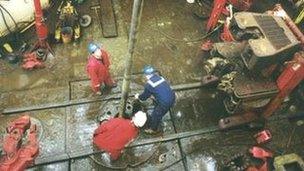New offshore tax measures criticised
- Published

Drilling contractors warned the new tax rules would "render some UK projects uneconomic"
The UK government has been criticised over new tax rules affecting North Sea operators.
The International Association of Drilling Contractors (IADC) claimed Budget changes over drilling rigs and accommodation vessels would cost firms an estimated £145m in the coming year.
The bareboat chartering tax changes follow a UK government consultation launched after the Autumn Statement.
IADC warned the measure would cause the UK offshore sector to shrink.
But Scottish Secretary Alistair Carmichael said the government had listened to the oil and gas industry and "come back with a fair proposal".
In a statement, IADC executive vice president Taf Powell said member companies were "deeply disappointed" at the UK government move.
He said: "We believe this is not sustainable to our industry and will cause the UK offshore sector to shrink; overall we think the costs to the UK economy will be higher than the immediate extra tax revenues forecast by these measures.
"The tax-raising measures invalidate existing pricing agreements between drilling contractors and Her Majesty's Government, and the additional costs will render some UK projects uneconomic.
"In addition, where the additional costs cannot be passed on to the client, rigs may be withdrawn from the UK, and new North Sea class rigs intended for the UKCS [UK Continental Shelf] will be diverted to countries where economic returns are more predictable."
'Fiscal instability'
He added: "Drilling rigs are inherently mobile; and drilling contractors are inherently international.
"Drilling companies, many of them having recently installed their headquarters in the UK, are now considering the options for their businesses due to this latest example of fiscal instability that undermines claims that the UK is open for business."
Oil & Gas UK welcomed some measures announced by Chancellor George Osborne in Wednesday's Budget, including a consultation on a new allowance to encourage investment in ultra-high pressure high temperature oil and gas field clusters.
But it said it was concerned by the move to change the basis for taxation of drilling rigs and accommodation vessels supplied using chartering arrangements.
'Cost pressures'
Oil & Gas UK chief executive Malcolm Webb said: "This can only increase costs on the UKCS where operating costs have increased sharply in recent years and last year saw a rise of 15.5% to an all-time record of £8.9bn. New developments are facing similar cost pressures.
"In addition, we fear that this move will drive drilling rigs, already in short supply, out of the UKCS.
"Exploration over the last three years has been at its lowest in the entire history of the industry in the UK, with only 15 exploration wells drilled in 2013."
New rules
Martin Findlay, tax partner at KPMG in Aberdeen, said the new tax rules would increase the costs to oil and gas companies of doing business in the UK.
He added: "The new rules will apply from April to those operating drilling rigs and accommodation vessels and which use assets of other group companies in the provision of their services to oil companies.
"Costs of those service companies will increase the costs that will need to be passed on to the UK companies searching for and extracting oil and gas from UK waters.
"Drillers tied in to fixed contracts with oil companies will have no opportunity to reset their prices, so will have to bear the extra tax."
Responding to the comments, Scottish Secretary Alistair Carmichael said: "This is a consultation that has been going on since the Autumn Statement.
"You have a number of companies which pay their taxes to the United Kingdom.
"There are a large number though making substantial profits out of bareboat chartering in the North Sea, taking that money away essentially as a tax avoidance measure.
"I don't think they should be treated differently. We got a range of views, and as a result, we made changes.
"Seismic ships, and floating production and storage ships which don't make a lot of money but which are important, were taken out."
He added: "We have listened to the industry. We have come back with a fair proposal and I think it will be supported."
- Published25 February 2014
- Published24 February 2014
- Published24 February 2014
- Published24 February 2014
- Published24 February 2014